Allahumma Inni Abduka Wabnu Abdika Dua Meaning, Arabic, and Hadith
Allahumma inni abduka wabnu abdika is powerful supplication to be recited during times of worries and sadness. In this post, we will learn the meaning, translation and importance of this Dua.
Advertisements
Allahumma Inni ‘Abduka Meaning in English
The meaning of allahumma inni ‘abduka in english is O Allaah, I am Your slave, the son of Your male slave, the son of Your female slave. My forelock is in Your Hand, Your predestination is applying on me, and Your ruling regarding me is just. I ask You by every Name of Yours, that You names Yourself, taught to one of Your creation, sent in Your Book, or kept exclusive to knowledge of the unseen with You, to make the Qur’aan the spring of my heart, the light of my chest, the removal of my sadness, and the thing that causes my worries to depart, Allaah will remove their worries and sadness and will replace it with relief.
Allahumma Inni ‘Abduka Wabnu Abdika in Arabic
Here is Allahumma Inni Abduka in Arabic text.
اللهم إني عبدُك وابنُ عبدِك وابنُ أَمَتِك، ناصِيَتِي بِيَدِكَ، مَاضٍ فِيَّ حُكْمُكَ، عَدْلٌ فِيَّ قَضَاؤُكَ، أَسْأَلُكَ بِكُلِّ اسْمٍ هُوَ لَكَ، سَمَّيْتَ بِهِ نَفْسَكَ، أَوْ أَنْزَلْتَهُ فِي كِتَابِكَ ،أَوْ عَلَّمْتَهُ أَحَداً مِنْ خَلْقِكَ، أَوِ اسْتَأْثَرْتَ بِهِ فِي عِلْمِ الْغَيْبِ عِنْدَكَ: أَنْ تَجْعَلَ الْقُرْآنَ رَبِيعَ قَلْبِي، وَنُورَ صَدْرِي، وَجَلَاءَ حُزْنِي، وَذَهَابَ هَمِّي
Transliteration
Allaahumma Inni Abduka wa ibnu Abdik wa ibnu Amatik, Naasiyati biyadik, Maadhin Fiyya Hukmuk Adlun Fiyya Qadhaa’uk, As’aluka bi Killismin Huwa Lak, Sammayta bihi Nafsak Aw Allamtuhu Ahadan min Khalqik Aw Anzaltahu fi Kitaabik Aw ista’tharta bihi fi Ilmi al-Ghaybi Indak, an Tajal al-Qur’aana Rabeea Qalbi wa Noora Sadri wa Jalaa’a Huzni wa Thahaaba Hammi.
Advertisements
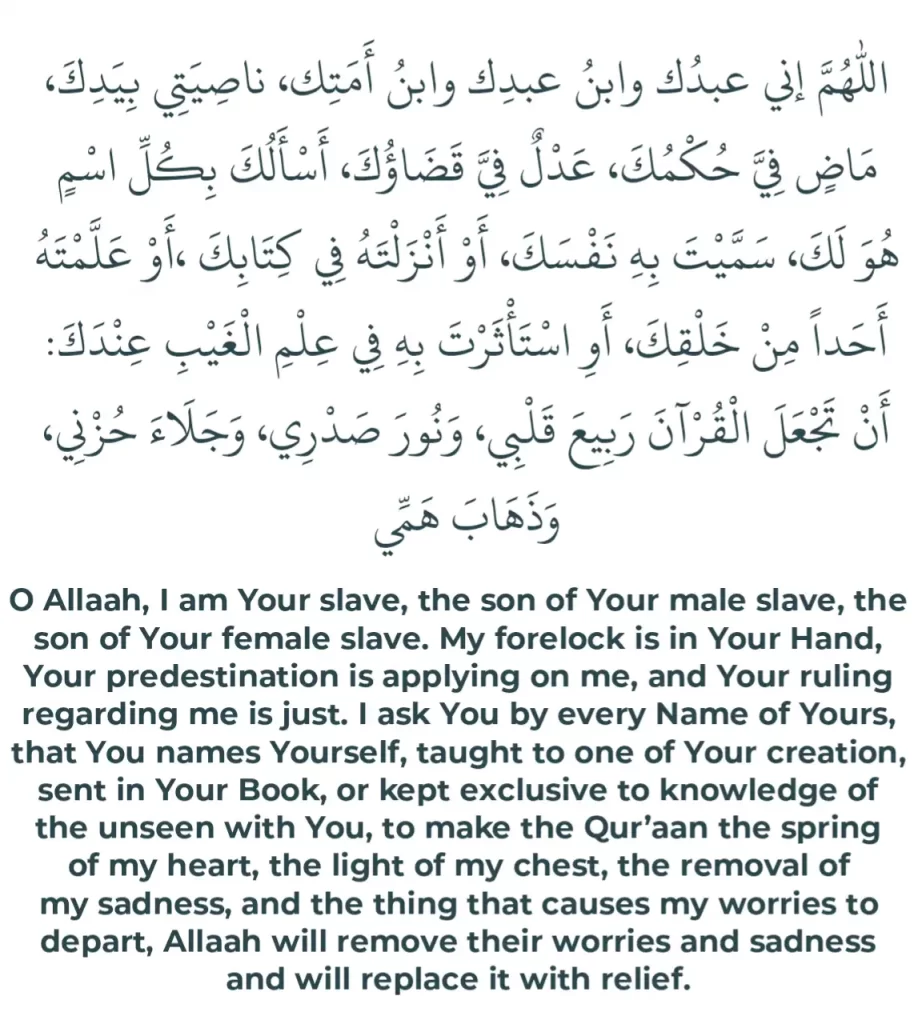
Allahumma Inni Abduka Wa Ibnu Abdika Hadith
Abdullaah ibn Mas’ood, may Allah be pleased with him, said that the Messenger of Allah, sallallaahu alayhi wa sallam, said:
“When a person becomes worried or sad and says:
‘O Allaah, I am Your slave, the son of Your male slave, the son of Your female slave. My forelock is in Your Hand, Your predestination is applying on me, and Your ruling regarding me is just.
I ask You by every Name of Yours, that You names Yourself, taught to one of Your creation, sent in Your Book, or kept exclusive to knowledge of the unseen with You, to make the Qur’aan the spring of my heart, the light of my chest, the removal of my sadness, and the thing that causes my worries to depart, Allaah will remove their worries and sadness and will replace it with relief.
It was said: “O Messenger of Allaah, should we not learn it.” He, sallallaahu `alayhi wa sallam, said: Yes, it is appropriate for the one who hears it to learn it.
Reported by Ahmad (3704) and Al-Albaani ruled it as authentic in his book As-Saheehah (199).
This Hadeeth comprises of four fundamental principles; there is no way for a slave to achieve happiness and remove their worries and sadness except if they were to act in accordance with them and truly realize them:
Read also similar post:
- Allahumma Inni A Udhu Bika Minal Hammi Wal Hazan
- Allahumma Ajal Fi Qalbi Noora – Arabic Text And Meaning
- Allahumma Inni As’aluka Min Fadlik Meaning
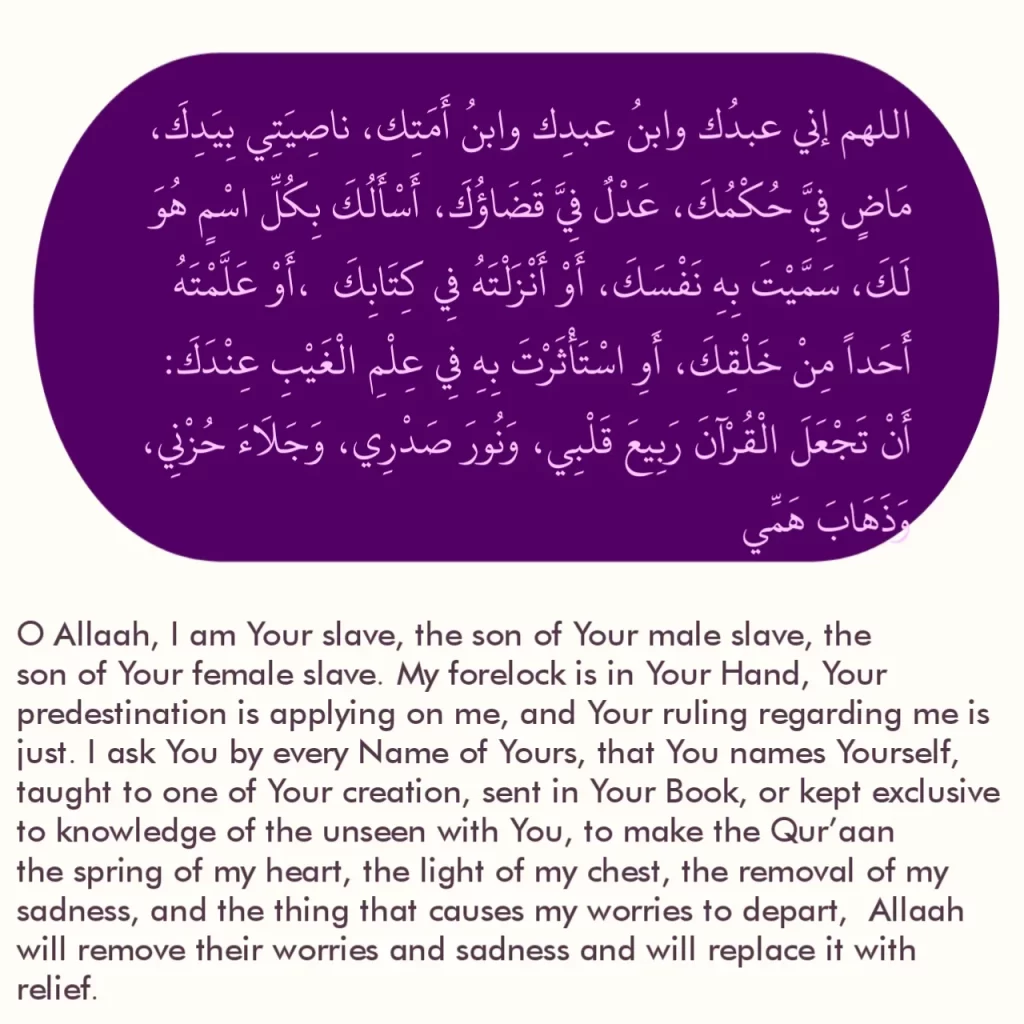
The first fundamental principle:
Realization of worship of Allaah the Exalted complete submission and humility before Him, and for the slave to acknowledge that they, their fathers, and mothers are created by Allaah and owned by Him.
Advertisements
This is taken from when he, sallallaahu `alayhi wa sallam, said: O Allaah, I am Your slave, the son of Your male slave, the son of Your female slave.
He, sallallaahu `alayhi wa sallam, did not suffice with saying: I am Your slave, but rather, added:
The son of Your male slave, the son of Your female slave, in order to show humility and submission, and acknowledge servitude.
Advertisements
This is more eloquent and drives the meaning better in showing complete humility and servitude, because whoever owns someone, it is not the same if they own just that person and if they were to own that person as well as their parents.
The second fundamental principle:
The slave believes in the predestination of Allaah the Exalted, and that whatever He Wishes to happen will happen, whatever He does not wish to happen will not happen, none can adjust His ruling, and none can reject His predestination.
That is noted when he, sallallaahu alayhi wa sallam, said:
My forelock is in Your Hand, Your predestination is applying on me, and Your ruling regarding me is just.
The third fundamental principle:
The slave must believe in the Beautiful Names and Great Attributes that are mentioned in the Qur’aan and Sunnah, and should use them as a medium between them and Allaah the Exalted.
That is taken from when he, sallallaahu `alayhi wa sallam, said:
I ask You by every Name of Yours, that You names Yourself, taught to one of Your creation, sent in Your Book, or kept exclusive to knowledge of the Unseen with You.
The fourth fundamental principle:
One should be keen on and careful of the Noble Qur’aan; the Speech of Allaah. It contains guidance, cure, sufficing, and good health.
So long as the slave shows great concern regarding the Qur’aan, they will achieve happiness, tranquility, relief in their chest, and removal of sadness and worry due to that.
That is why he, sallallaahu `alayhi wa sallam, said in the supplication:
Make the Qur’aan the spring of my heart, the light of my chest, the removal of my sadness, and the thing that causes my worries to depart.
These are four great fundamentals that are understood from this blessed supplication.
It is appropriate for us to reflect on them and strive to implement them, so that we can attain this noble promise and great favor, and it is when he, sallallaahu alayhi wa sallam, said:
Allaah will remove their worries and sadness and will replace it with relief.
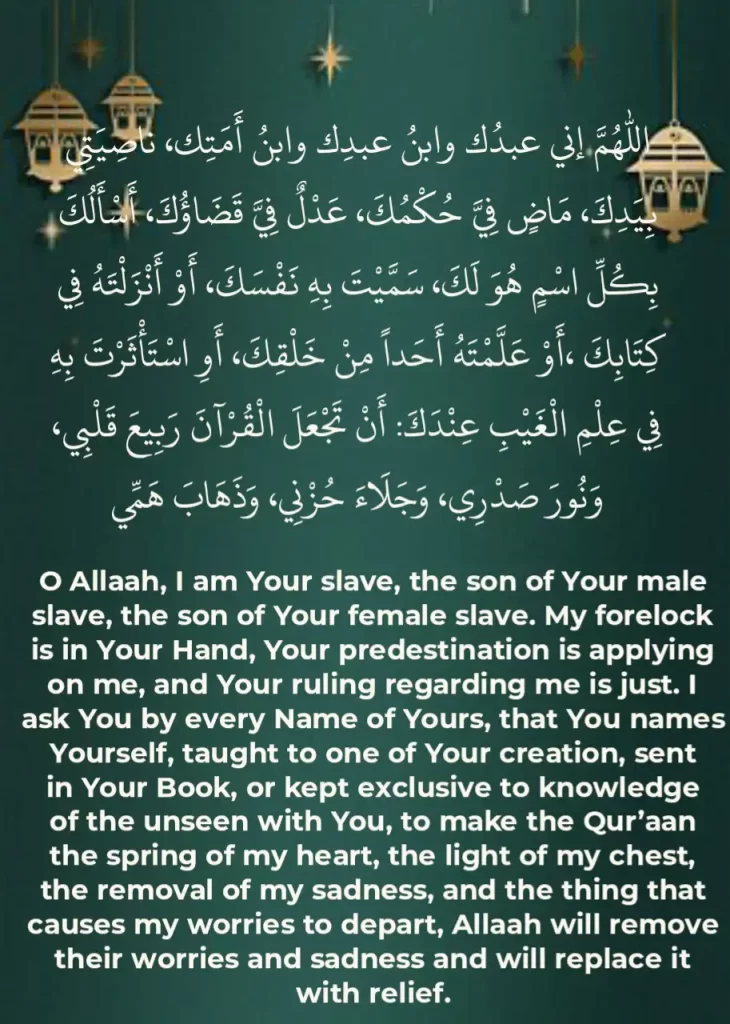
Benefits Of The Dua
The beautiful dua we’ve shared has numerous potential benefits, both spiritual and emotional, for those who recite it sincerely. Here is a list of some of the potential benefits:
- Increased Submission to Allah: The dua begins with an acknowledgment of one’s status as a slave of Allah. Reciting this dua can help reinforce a sense of humility and submission to the Creator.
- Trust in Allah Destiny: By stating that one’s forelock is in Allah’s hand and acknowledging His predestination, this dua can help individuals trust in Allah’s plan for their lives, reducing anxiety about the future.
- Affirmation of Divine Justice: Reciting the phrase “Your ruling regarding me is just” can remind believers of Allah’s justice, which can provide comfort during times of adversity.
- Invocation of Allah’s Names: The act of invoking all of Allah’s names emphasizes the significance of His attributes. It’s a way of seeking His divine assistance and blessings by acknowledging His names.
- Connection with the Quran: The core of the dua involves seeking blessings from the Quran. This can help individuals establish a stronger connection with the Quran, enhancing their understanding and application of its teachings.
- Inner Peace: The dua asks for the Quran to be the spring of the heart and the light of the chest. Reciting it can bring a sense of inner peace and tranquility, especially during difficult times.
- Emotional Relief: By asking for the removal of sadness and worries, this dua can provide emotional relief and comfort to those who are going through challenging situations.
- Strengthened Faith: Consistently reciting this dua can help strengthen one’s faith and reliance on Allah, increasing one’s spiritual well-being.
- A Reminder of Humility: The opening lines of the dua serve as a reminder of one’s humble origin and the need for continuous humility before Allah.
- A Connection to the Unseen: By invoking Allah’s names, some of which are known only to Him, this dua highlights the believer’s connection to the unseen and the mysteries of the divine.
- A Sense of Purpose: Acknowledging Allah’s predestination and rulings can provide individuals with a sense of purpose and trust in the greater plan for their lives.
- Psychological Comfort: The act of reciting this dua can provide psychological comfort and a sense of relief by focusing on divine support and guidance.
Advertisements

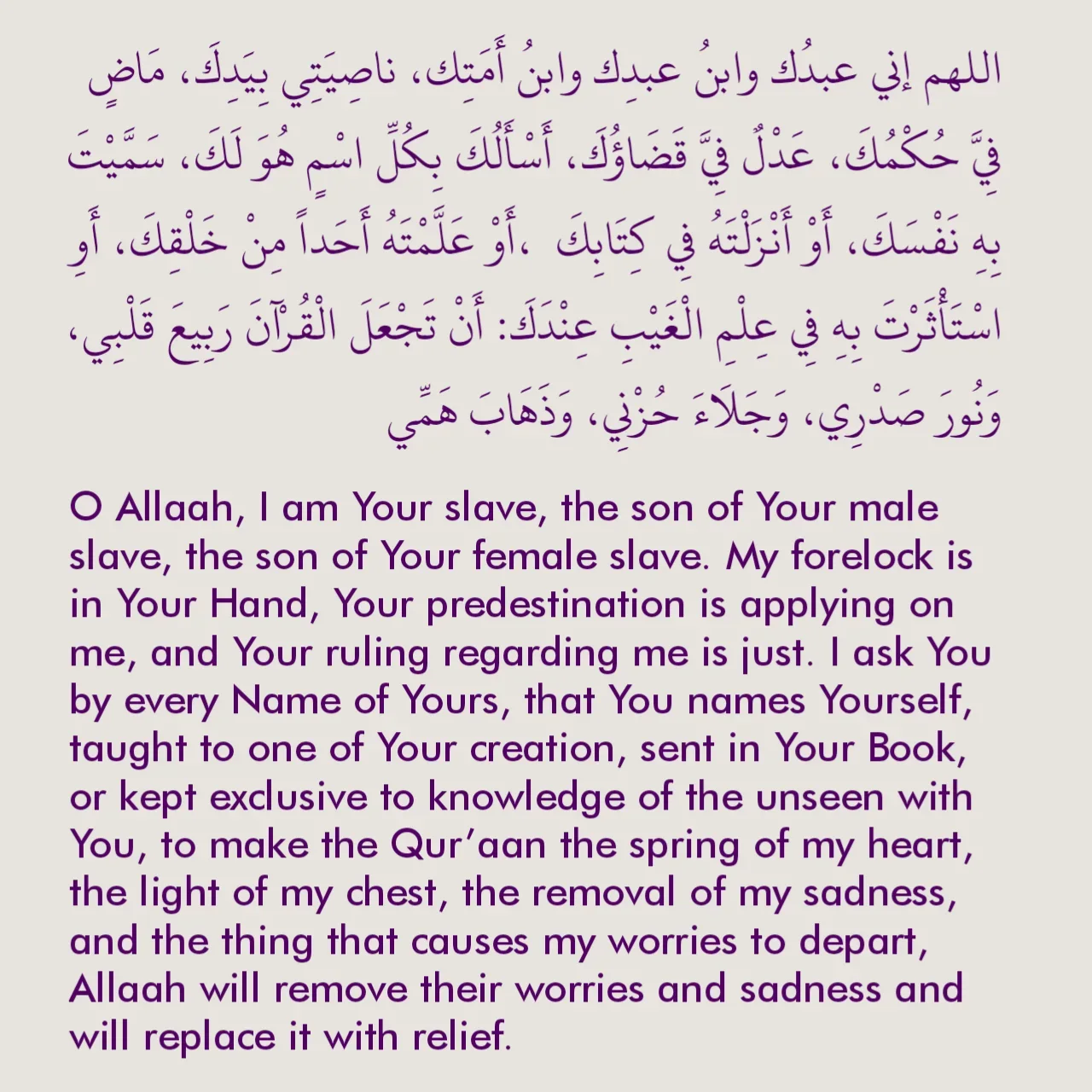
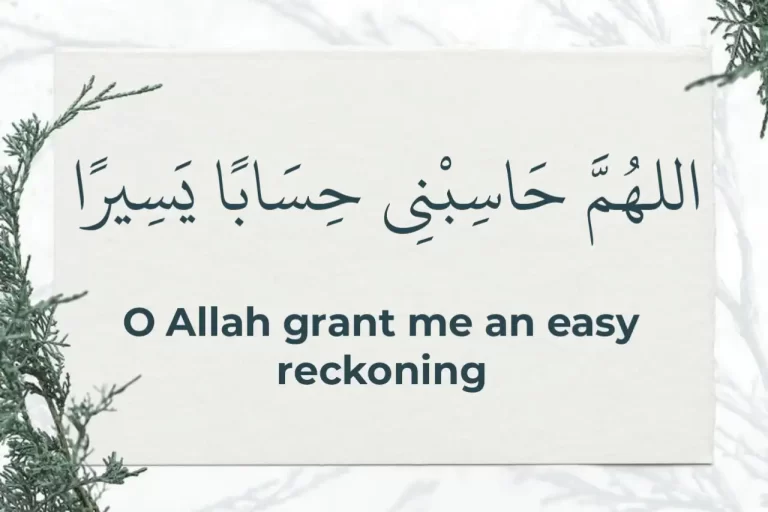
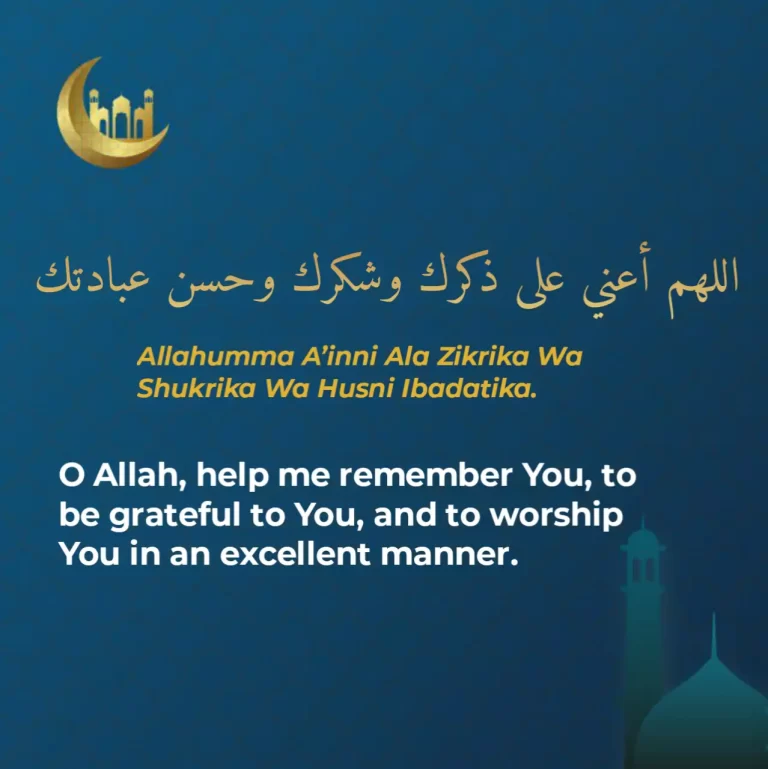
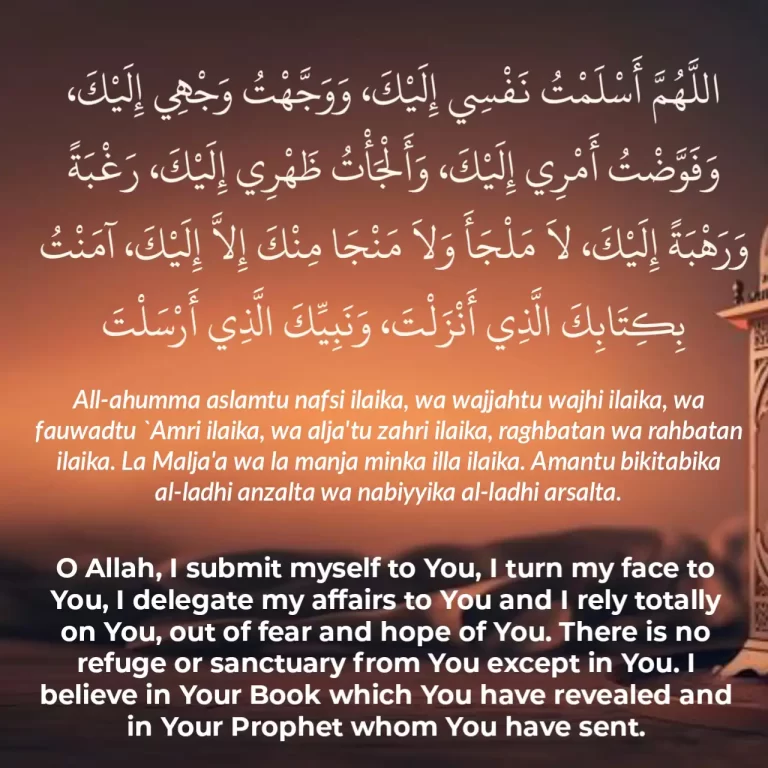
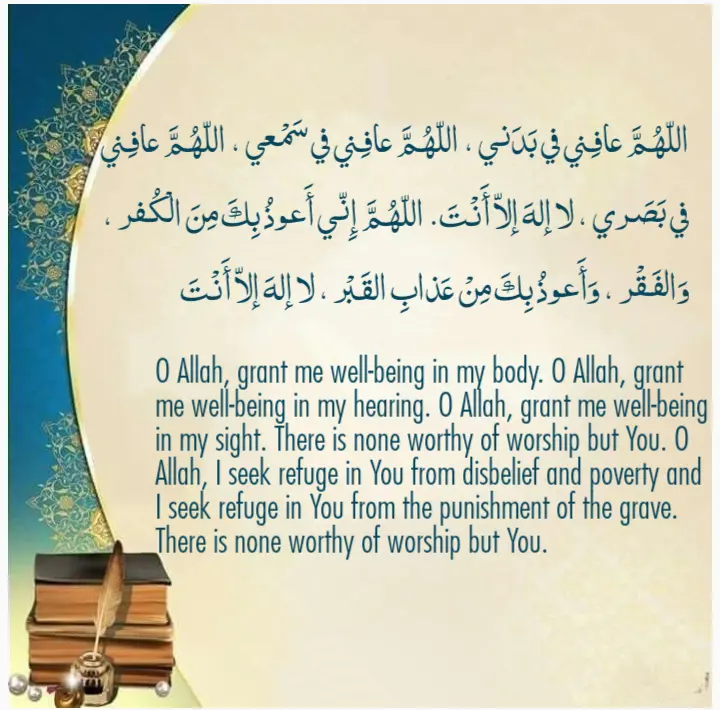


One Comment